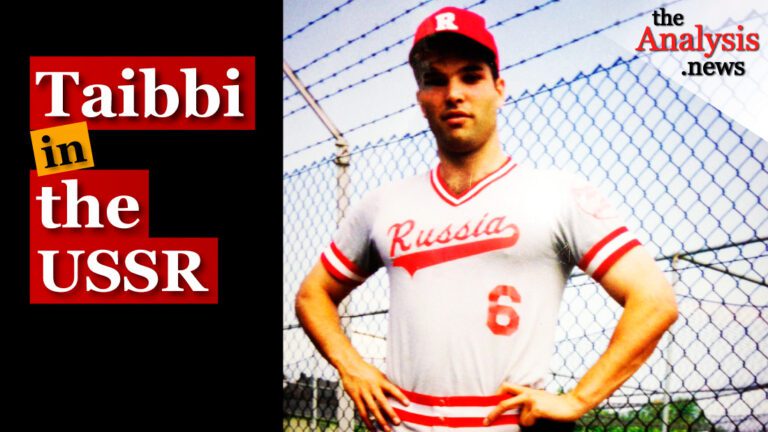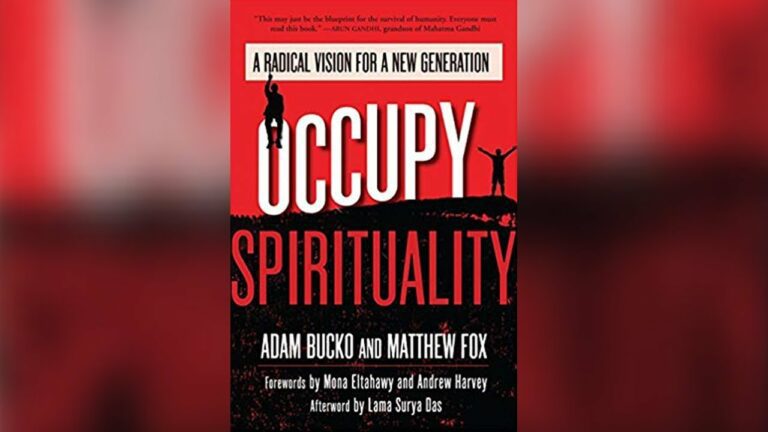This is an episode of Reality Asserts Itself, produced on October 27, 2013. On Reality Asserts Itself with Paul Jay, author Max Blumenthal discusses his new book and traces the rise of Avigdor Lieberman and current policies of ethnic cleansing in Israel.
PAUL JAY, SENIOR EDITOR, TRNN: Welcome to The Real News Network. I’m Paul Jay. And welcome to Reality Asserts Itself.
When I was a teenager in the late 1960s, I visited a relative in Israel. She’d gone to live on a kibbutz. If at that time a political leader of Israel had talked in overt racist language, had talked about cleansing Israel of its Arab population, I think the people my relative knew would have been appalled. Most Israelis I ran into–and I think it would be true to say most Israelis in general–would not accept that they belong to a state that was essentially racist, and certainly would not accept their political leaders talking that way.
Well, these days there are political leaders in Israel that talk exactly like that. And one of the faces of that is Avigdor Lieberman, who was Israel’s foreign minister.
In a new book by Max Blumenthal, titled Goliath: Life and Loathing in Greater Israel, Max looks at this growing racism or growing overt racism in Israel. And early in the book he looks at the life and personality and role of Mr. Lieberman.
And now joining us in the studio to talk about his book is Max Blumenthal. Max is an award-winning journalist and bestselling author whose articles and video documentaries have appeared in The New York Times and many other publications. His most recent book, as I said, is Goliath: Life and Loathing in Greater Israel. His last book was Republican Gomorrah: Inside the Movement That Shattered the Party, which was a New York Times and Los Angeles Times bestseller.
Thanks for joining us.
MAX BLUMENTHAL, AUTHOR, JOURNALIST, BLOGGER: Great to be on with you.
JAY: So your book, you deal with episodic–different episodes, you can say, glimpses of Israel and this growing, overt racist culture. And I say overt because, you know, many people will argue that if you have a state based on a religion, you’re already into kind of a core of a racist idea, or at least ethnic idea, in the very formulation of the ideology that goes with that state. But how open and how many people seem to accept the openness of this rhetoric certainly shocked me when I was there again just about three years ago.
So, early in the book you quote a poll. And let me quote it. In 2009, a poll of Russian immigrants, 77 percent supported forcibly transferring Palestinians out of Israel.
So talk about this wave of Russian immigrants and whose primary political representative is Avigdor Lieberman.
BLUMENTHAL: Well, as you mentioned, Israel is an ethnocracy. It’s not an actual multiethnic, multireligious democracy. It’s not a real democracy. At best you can call it a Herrenvolk democracy, because it privileges one group which happens to be a group of exogenous immigrants who have been settled through colonial methods against the will of the indigenous Palestinian population, privileges them over non-Jews who are living in historic Palestine, which is everywhere from the Jordan River to the Mediterranean Sea. And so you have this system in place which requires the engineering of a Jewish demographic majority.
And this is really–like, as we’re opening the interview, we’re getting to the essential idea in my book, which is that when you have a system like this, you naturally–you go through a historical process–it could take 100 years, it could take less time–in which the state moves to a terminal phase of overt racism and even proto-fascism. I never call Israel a fascist state or describe the political atmosphere as fascist in the book, but I quote almost dozens of leading liberal Israelis, like Uri Avnery, founding-generation Israelis like Chana Maron, who performed at the Habima Theater in the original Hebrew plays right off Tel Aviv’s Rothschild Boulevard before the state was even founded, saying that fascism is in the air, that we’ve become a fascist state, and that we’re almost ready to divorce ourselves from it.
Now, one of the factors in this progression, completely and directly related to the need to engineer a Jewish demographic majority, to basically out-breed the Palestinians in this, you know, conflict where virility equaled victory, was the importation of millions of post-Soviet Russian Jews after the collapse of the Soviet Union. This was the largest demographic, one of the largest demographic increases in recent Israeli history, or probably the largest. I think they increased their Jewish population by somewhere like 30 percent. And somewhere around 300,000 of these Russians have been declared by Israel’s state-appointed rabbis to not be halachically Jewish, or to not actually be Jewish according to Jewish law. So they were convinced by the Jewish Agency to come to Israel and reap all these benefits, and now they’ve been defined as kind of non-Jewish. They’re discriminated against to some degree. They’re treated pretty badly by the veteran Israelis.
And you have Lieberman, who moves into Israeli politics, starting in the late ’80s, moves into the Likud Party, courtesy of Benjamin Netanyahu, and he starts not just talking about the, you know, immediate practical interests of the Russian Israeli public, but talking about their political interests and speaking to their political sensibility, which was not necessarily democratic, which was very authoritarian.
You mentioned this poll–77 percent favor the expulsion of Palestinians. Actually, a bare majority of Jewish Israelis overall favor the expulsion of Palestinians in that poll.
And so Lieberman rises to the top first through the Likud Party, who was appointed faction chairman by Netanyahu, I think, in 1992. And then he, I think, moves into Netanyahu’s cabinet in a low level in 1996 when Netanyahu comes into power. Then, when he runs for reelection, starting in, I think, ’99, he starts picking up two seats every year through the Yisrael Beiteinu Party, which catered to Russian interests and showed the political power of the Russian public.
And so on the one hand, they’re campaigning for civil marriage, because in Israel you have this theocratic system of marriage where, you know, Israelis have to go to Cyprus to get a civil marriage, and for the Russians who are not defined as Jewish this is, you know, problematic.
And on the other hand, he’s campaigning to reduce the amount of Palestinians in Israel and inspiring this racist trend and shouting at Palestinian members of Knesset that you should take your bundles and leave, and that we’ll take care of you one day, he said to a member of the Balad Party, and, you know, basically threatening to kill them, introducing laws to strip them of their citizenship.
And then, by 2009, which is where my book really begins, Lieberman comes into power in earnest. They had previously had to create these fake cabinet positions for him, like minister of strategic affairs, as if he had any experience in strategery.
And finally, Lieberman becomes the third-largest–through Yisrael Beiteinu, becomes the third-largest party in Israel in the 2009 elections, which were conducted against the backdrop of Operation Cast Lead, this brutal assault on the Gaza Strip which helped fuel the right-wing mood of the Israeli public. And Lieberman catered to it perfectly, running commercials showing Arab members of Knesset next to statements in which he accused them of expressing disloyalty. And the slogan, the winning slogan of Lieberman, which is also the winning slogan of Likud, is “No loyalty, no citizenship”. And so he promised to introduce law after law in the next Knesset–and he did–that would eventually strip Palestinian citizens of Israel of their citizenship. And this has become the trend in Israeli society, even though Lieberman has been sort of weakened politically.
It’s worth mentioning, since you brought him up, two important points. In 2009, Yisrael Beiteinu won high school mock elections in Israel by a wide margin, which shows you where the youth are at in Israel, I mean, not just among the Russian youth but overall. And at the same time, he just lost an important election in the municipal elections. His candidate in the Jerusalem mayoral election, Moshe Lion, has lost. He was defeated by Nir Barkat, who many left-wing Zionists in Israel celebrate, even though he’s behind the Sheikh Jarrah expulsions and behind a lot of the settlement activity in East Jerusalem. So you have right wing running against far right.
And Lieberman has been temporarily removed from his position as foreign minister because of his ties to the mafia, which I discuss at length. He’s going on trial in two weeks. I discuss at length how these mafioso figures, like Michael Cherney, who is originally a Russian mafia-linked figure, set up these fake companies for Lieberman in Cyprus and put his daughter on the payroll, who was 22, and paid her 200,000 a year, and was basically just giving him bags of cash, just textbook, you know, just textbook corruption.
And he’s been replaced by someone named Ze’ev Elkin, who I interview in my book, who is also from Moscow, also a Russian. But he’s in the Likud Party. He’s even younger than Lieberman, and he’s actually even more extreme. And he doesn’t even speak English, and he’s the foreign minister of Israel. And he favors annexing most of the West Bank, something even Lieberman doesn’t favor. So that’s remarkable, I think.
JAY: Let’s just–to get a sense of what Lieberman stood for and how that was acceptable, to have a foreign minister that stood for this, talk about the Lieberman Plan, because if you have the two-state solution the way Lieberman sees it–he has a very interesting map.
BLUMENTHAL: Well, I think that Plan Lieberman is what the U.S. and Israel are proposing to the Palestinian Authority as the two-state solution. The only difference is that Lieberman proposes to do it unilaterally. The main element of this plan, which complements the laws that he’s introducing inside Israel, which are designed to basically drive the Palestinian citizens out or marginalize them, is to redraw the borders of Israel. He’s not going to actually send soldiers into anyone’s home and drag them out and send them on buses to Jordan, but there is the Arab Triangle, which are a series of Arab towns which contain a huge population cluster in the north of Israel near the Green Line, and he’s basically proposing to redraw the Green Line around these communities and strip them of their citizenship and place them into the hands of the autocratic Palestinian Authority and strip them of, of course, all the benefits they’re receiving. So they don’t want that, obviously. No one wants to be stripped of their citizenship just because they don’t have J-positive blood.
JAY: I was in Israel in the late ’60s. As I said, I don’t think (and you can correct me if I’m wrong) that you could have had a Lieberman as a foreign minister and Israeli political culture could have accepted having–especially–never mind just a minister, but a foreign minister, the face of Israel to other countries, being so overtly racist. But then you could. How do we get from that to that?
BLUMENTHAL: Well, when you mentioned the late ’60s, this was right after 1967, when the occupation of the West Bank and the Gaza Strip began, and you’ve got a different political culture in Israel, that labor Zionism was still dominant, although they had sowed the seeds for the rise of Likud. But you had politicians and generals doing more or less what Lieberman plans to do. And you could argue that Lieberman has not been responsible for the same degree–actually, he may not have been responsible for any degree of the kind of ethnic cleansing that the labor Zionist movement has done. In fact, that’s something that you’ll hear from the Russian public is, like, you call us fascists; well, what about you what you did? You committed the Nakba. You ushered in the occupation.
And in 1967, Tel Aviv and Jerusalem–first of all, Israeli society was a small state that was unsure of its own survival, insecure, and the victory was like this rapturous moment which was endorsed by a who’s who of the labor Zionist intelligentsia, along with the revisionist Zionist intelligentsia. And I write about the Greater Israel document in Israel, which was basically an endorsement of the occupation and a declaration that the West Bank, which they call Judea and Samaria, is the cradle of the nation. And this was authored by people across the political spectrum with almost no opposition. And it required a lot–in order to conquer the West Bank, massive amounts of ethnic cleansing were required. Three hundred thousand Palestinians were driven from their homes while Abba Eban, who is, you know, considered this, you know, elegant, silver-tongued intellectual figure who was revered by American Jews and by Western diplomats,–
JAY: And always on American television.
BLUMENTHAL: –always on American television.
JAY: Abba Eben’s a good example of what I’m talking about. No matter what Israel’s doing in practice in the real world, the face it shows to the outside world, but also, it seems to me, the face that they want to present to domestic public opinion in Israel, is this kind of enlightened, articulate, cultured man who would never admit to being some overt racist. But then Lieberman can. And I wonder, does this also have something to do with American politics, that that is now acceptable in American politics, that Israel can have this face and it doesn’t shake America’s support for Israel an iota?
BLUMENTHAL: Well, Americans want to believe that there’s a good Israel. And, you know, Israel’s strategic deterrence is contingent on projecting a good image to Washington. So we’re seeing their PR strategy slowly collapse as figures like Lieberman come to the fore.
But we have to remember that, you know, the American media, which, you know, shies away from books like Goliath, has actually made pretty–some members of the mainstream press have made a pretty concerted attempt to help whitewash Lieberman. Robert Siegel from NPR hosted Lieberman in Washington at a banquet and interviewed him and was giving him some pretty softball questions in front of a who’s who of the Beltway elite. I find this completely remarkable, that someone who is actively campaigning to strip people of their citizenship because of their ethnicity was treated in such a manner. But as I said, his successor, Ze’ev Elkin, couldn’t even do that interview ’cause he can’t even speak English. So it’s, you know, really a race to the bottom.
And I–you know, going back to 1967, there were three villages I write about, in the Latrun gap, which the Israelis considered, like, this finger sticking into the state of Israel, and it prevented them from building a highway from Tel Aviv to Jerusalem. These were ancient villages. One of them, Imwas, was Emmaus in the Bible, and it’s where Jesus met with three of his disciples. The Israelis bulldozed all of these villages. Amos Kenan, who was a commander, wrote about it in a really harrowing letter, which wasn’t supposed to be exposed. He talked about the church being–you know, the church crashing to the ground, these homes being bulldozed, the families being told to march to Ramallah. And in their place, the Jewish National Fund has built Canada Park, which is a forest, and a lot of American Jews go to visit Israel and they think, wow, they’re making the desert bloom–they’re planting these trees. And that’s how this is promoted to them. When you walk into this forest, as your correspondent, Lia Tarachansky did in her upcoming documentary, Seven Deadly Myths, you literally can trip over the ruins of Palestinian homes.
JAY: Yeah. If you look on our site, you can see Lia’s story about this forest.
BLUMENTHAL: Yeah. And so I think this is a perfect metaphor for the kind of image that Israel tries to project to the outside world, and especially to Washington. And what I’ve tried to do with this book is to actually get inside the forest and talk about the ruins, talk about what lies beneath these pinecones and these mountains of lies.
JAY: Okay. Well, we’re talking about Lieberman, who represents, you could say, the far right of mainstream Israeli politics and the ideology policy of expulsion and ethnic cleansing. But what I thought very interesting in your book is that if you look at one of the figures of the center, Tzipi Livni, who represents one of the supposed centrist politicians, had a policy of expulsion not so different than Lieberman’s. So in the next part of our interview, we’re going to talk about the Israeli center and the policy of ethnic cleansing in Israel.
Please join us for part two of our interview with Max Blumenthal on Reality Asserts Itself on The Real News.
Never miss another story
Subscribe to theAnalysis.news – Newsletter
“Max Blumenthal (born December 18, 1977) is an American author and blogger. Blumenthal is the editor of The Grayzone website, which is known for its apologetic coverage of—among other authoritarian regimes—the Chinese, Russian, Syrian, and Venezuelan governments, as well as denial of the Uyghur Genocide and other atrocities committed by these regimes.”











